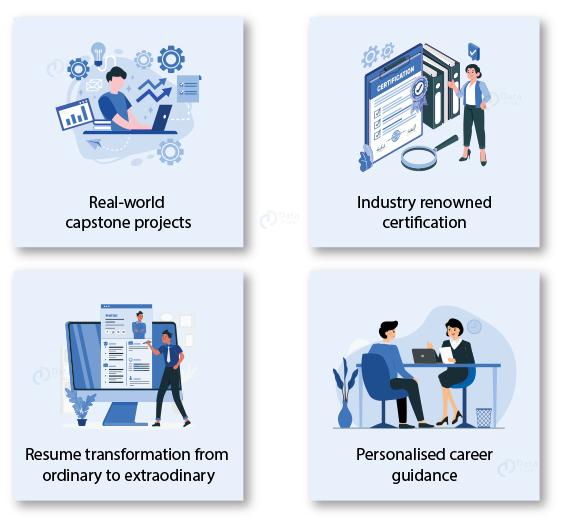Hibernate Certification Course [Hindi]
This course, Hibernate, equips students with the knowledge and abilities to handle database interactions in their applications by offering a thorough examination of this potent object-relational mapping (ORM) framework for Java. Hibernate provides an elegant and fast way to solve database-related problems by mapping Java objects to database tables, which simplifies data management.
What will you take home from this Hibernate Course?
- Self paced video-based course
- Complete study materials, practicals, quizzes, projects
- Acquire practical knowledge which industry needs
- Practical Hibernate course with real-time case-studies
- Lifetime access with industry-renowned certification
|
Start Anytime, it’s self-paced |
Course Duration 40+ Hrs |
Access Duration 2 Years |
Price
|
 This course, Hibernate, equips students with the knowledge and abilities to handle database interactions in their applications by offering a thorough examination of this potent object-relational mapping (ORM) framework for Java. Hibernate provides an elegant and fast way to solve database-related problems by mapping Java objects to database tables, which simplifies data management.
This course, Hibernate, equips students with the knowledge and abilities to handle database interactions in their applications by offering a thorough examination of this potent object-relational mapping (ORM) framework for Java. Hibernate provides an elegant and fast way to solve database-related problems by mapping Java objects to database tables, which simplifies data management.What will you take home from this Hibernate Course?
- Self paced video-based course
- Complete study materials, practicals, quizzes, projects
- Acquire practical knowledge which industry needs
- Practical Hibernate course with real-time case-studies
- Lifetime access with industry-renowned certification
|
Start Anytime, it’s self-paced |
Course Duration 30+ Hrs |
Access Duration 2 Years |
Price
|
Why should you enroll in this Hibernate course?
- Learn everything there is to know about Hibernate’s architecture, configuration, and mapping techniques
- Reduce boilerplate code by learning how to use Hibernate to execute CRUD (Create, Read, Update, Delete) actions with ease
- Examine more complex mapping ideas to optimize database schema design, such as one-to-one, one-to-many, and many-to-many relationships
- Comprehend transaction management in Hibernate to guarantee data integrity and consistency in intricate applications
- Discover how to easily include Hibernate into Spring applications, fusing two potent technologies for extensive enterprise-level software
- Learn how to optimize Hibernate performance by utilizing effective database interaction, caching strategies, and query optimization
- Utilize your knowledge in real-world circumstances by working on practical projects that allow you to acquire experience implementing Hibernate in a variety of use cases
- Adopt design patterns and industry best practices in Hibernate development to promote scalability and maintainability of code
- Our course ensures that learners have a full understanding of the framework by covering Hibernate in detail, from fundamentals to advanced topics
- Take advantage of the ideas, best practices, and real-world examples that knowledgeable teachers can offer to your learning process
- Keep up with the most recent Hibernate developments, trends, and best practices to make sure your knowledge of Java development doesn’t become obsolete
- After completing the Java course, get a recognized certification that will validate your Hibernate expertise and boost your credibility in the job market
- Become a part of a dynamic learning community that promotes cooperation, networking, and information sharing among peers and business experts
- Take advantage of lifelong access to course materials, community support, and updates, which enable ongoing education and skill development
- Participate in practical projects and case studies to reinforce learning through real-world application of theoretical information
Hibernate Course Objectives
With a focus on providing participants with a deep grasp of one of the most influential Object-Relational Mapping (ORM) frameworks in Java development, this extensive course on Hibernate has been carefully designed. Beginning with the basics, participants will delve into the details of Hibernate, dissecting its design and becoming adept at mapping techniques to create a smooth connection between relational databases and Java objects.
Advanced subjects like Hibernate Query Language (HQL), Criteria API, transaction management, and cache techniques are covered as the course goes on, giving students the comprehensive knowledge they need to run scalable and effective database operations. This Hibernate course is unique in that it places a strong focus on practical application through practical projects that let students apply their academic knowledge to real-world situations.
This Hibernate course offers an engaging learning experience for both novices and experienced Java developers who want to learn more about ORM frameworks and improve their database management abilities. With a focus on project-based learning, industry-relevant material, and experienced instruction, participants will not only master Hibernate but also acquire the confidence to design reliable and effective Java applications in a variety of enterprise environments.
The goal of this online Hibernate course is to give learners a solid understanding of Java object-relational mapping and the ability to use Hibernate to communicate with databases efficiently. The first step of the Hibernate course is to make sure that students understand the fundamental ideas behind Hibernate, such as association handling, entity mapping, and primary key schemes. As they continue, participants will study more complex subjects like the Criteria API and Hibernate
Query Language (HQL), developing the ability to create complex queries for effective data retrieval. The main objective is to provide participants with the information and practical experience needed to effectively incorporate Hibernate into Java programs, maximizing persistence and data access. Instilling in participants industry-relevant insights and best practices will also help them deploy Hibernate in a way that complies with modern development standards.
Effective transaction management, caching techniques, and performance optimization techniques will all be covered for participants. By the end of the Hibernate course, students will have refined their skills in designing Java applications that are both scalable and maintainable, exhibiting a grasp of Hibernate’s features and a preparedness to participate in practical projects. In addition to fostering a thorough awareness of best practices and the strategic application of Hibernate in contemporary Java programming, the Hibernate course objectives also seek to increase technical skills.
Why should you learn Hibernate?
Working with Java and complex databases has been made easy with the help of the technology of Hibernate. Following are some statistical and factual statements that will justify the importance and potential of this technology-
- “Hibernate simplifies database interactions, reducing development time and enhancing code maintainability.” – Java Developers’ Survey
- Hibernate is used by major enterprises worldwide, with a growing demand for skilled Hibernate developers in the job market.
- According to a survey, 80% of Java developers prefer Hibernate for its effectiveness in handling object-relational mapping challenges.
- “Learning Hibernate is an investment in creating scalable and efficient Java applications, crucial for modern software development.” – Industry Insights
What is Hibernate?
Java programs may communicate with relational databases more easily thanks to Hibernate, a robust and popular object-relational mapping (ORM) framework. Gavin King created the Hibernate framework, which enables developers to work with Java objects in their applications while easily persisting and retrieving data from a relational database.
Hibernate maps Java objects to database tables and vice versa. It successfully resolves the impedance mismatch between the relational structure of databases and Java’s object-oriented paradigm, freeing developers to concentrate on business logic rather than the complexities of SQL and database management. Basically, Hibernate offers a rich feature set, including association mappings, automatic table formation, and a query language known as Hibernate Query Language (HQL), to enable transparent and effective communication between Java objects and relational databases.
Hibernate makes data access and manipulation easier by abstracting the underlying database operations, giving developers a more user-friendly and object-oriented method of interacting with databases. Because of this, Hibernate is a well-liked option in Java programming, especially for tasks that value scalability, maintainability, and clean, modular code.
What to do before you begin?
Before beginning this online Hibernate course, here are some prerequisites for you to adhere to. Please note that these prerequisites are not mandatory to follow since everything is covered in the Hibernate course through and through. These advices will only help you complete this Hibernate course successfully-
- A basic foundation in fundamental Java principles is helpful since Hibernate is a Java-based framework.
- To understand how Java objects are mapped to database tables, become familiar with the fundamentals of databases and SQL queries.
- Although it’s not required, knowing the fundamentals of the Spring framework can help you better grasp how Hibernate integrates with Spring.
- Install Java, the required Hibernate dependencies, and an Integrated Development Environment (IDE) in your development environment.
Who should go for this Hibernate course?
This Hibernate course is ideal for a wide range of learners who want to improve their Java development abilities, especially in the areas of object-relational mapping and database interactions. The instruction is advantageous for-
- Aspiring Java Developers
- Web Development Enthusiasts
- Aspiring Database Administrators
- Software Engineers
- IT Graduates and Students
- Aspiring Java Architects
By enrolling in our Hibernate course, you can expect the following benefits:
Participants will go on a transforming journey to grasp the nuances of one of the most influential object-relational mapping (ORM) frameworks in Java development by enrolling in this in-depth Hibernate training. Beginning with the fundamentals, participants will become adept at deciphering Hibernate’s architecture, investigating its key functionalities, and appreciating how it slickly connects Java objects and relational databases.
The Hibernate course covers fundamental ideas including entity mapping, handling relationships, and primary key strategies, giving students a strong basis for proficient object-relational mapping. Participants will explore advanced topics such as transaction management, the Criteria API, cache methods, and Hibernate Query Language (HQL) as the session goes on. Hands-on projects that stress practical application will enable participants to apply their knowledge to real-world situations.
Participants will have learned how to use Hibernate to design, develop, and optimize database interactions in Java applications at the end of the Hibernate course. The online Hibernate course is designed to not only teach theory but also industry insights, best practices, and the self-assurance to take on challenging database-related tasks in a variety of Java programming projects.
There are several advantages to joining a Hibernate training program that supports career and personal development. Here are a few main advantages of training:
- Learn everything there is to know about Hibernate, including its advanced capabilities, core ideas, and best practices for object-relational mapping.
- Take part in practical tasks and real-world situations to put your theoretical knowledge to use and hone your skills in using Hibernate for database interactions.
- Make sure your knowledge of Java programming and Hibernate is up to date by keeping up with the most recent developments in the field, industry trends, best practices, and upcoming technologies.
- Gain knowledge from knowledgeable professors and professionals in the field who can accelerate your learning and offer insightful advice and practical examples.
- After completing the Hibernate course, obtain a recognized certification that will validate your Hibernate experience and increase your credibility in the job market.
- Develop in-demand abilities that will allow you to take on more positions in Java development projects and progress your career.
- Establish connections with educators, business leaders, and students to promote cooperation, networking, and idea sharing.
Jobs after Learning this Hibernate Course
After taking a Hibernate course, people can look into a variety of Java programming jobs, especially in positions that need effective database interaction and object-relational mapping. Professionals with experience with Hibernate can work in the following roles-
- Hibernate Developer
Focus on creating and executing Hibernate-based database interactions that guarantee efficient object-relational mapping in Java applications.
- Developer for Java
Utilize your Hibernate expertise to work on the front end and back end of web applications while contributing to the end-to-end Java development process.
- DBA, or database administrator
Prioritize streamlining the Hibernate integration process, maximizing database speed, and putting in place effective data storage and retrieval.
- Backend Software Engineer
Utilize Hibernate for database operations, transaction management, and data integrity assurance while working on the server-side of applications.
- Full Stack Programmer
Combine your expertise in front-end and back-end development to handle database interactions and build large-scale online applications with Hibernate.
- Developer for Java EE
Develop applications at the enterprise level using Java Enterprise Edition (Java EE) with Hibernate to produce scalable and reliable systems.
- Architect of the System
Participate in the planning and development of intricate systems, making use of Hibernate to manage databases efficiently and enhance data flow.
- Developer of Applications
Create applications that make use of Hibernate to connect with databases in a fluid manner, guaranteeing consistent data and quick retrieval.
- Technical Lead
Assume leadership positions, assisting development teams in utilizing Hibernate efficiently and guaranteeing compliance with Java development best practices.
- Java Technologies Consultant
A Java technology consultant offers Hibernate, database optimization, and effective Java development techniques as well as consulting services.
- Developer of Middleware
Pay attention to middleware technologies and how Hibernate may be used to connect databases and application logic in distributed systems.
Our students are working in leading organizations

Online Hibernate Training Course Curriculum
- Understanding ORM (Object-Relational Mapping)
- Evolution and significance of Hibernate
- Key features and advantages of using Hibernate
- Installation and configuration of Hibernate
- Configuring database connections
- Setting up Hibernate in a Java project
- Entity classes and Hibernate mapping
- Primary keys and identifier strategies
- Handling associations: one-to-one, one-to-many, many-to-one, many-to-many
- Introduction to HQL for database querying
- Querying entities and associations
- Named queries and parameter binding
- Overview of the Hibernate Criteria API
- Building queries using Criteria
- Query by example and restrictions in Criteria queries
- Understanding transactions in Hibernate
- Transaction management strategies
- Isolation levels and propagation
- First-level and second-level caching
- Configuring and optimizing caching
- Cache providers and cache strategies
- Introduction to Hibernate annotations
- Annotation-based mapping and configuration
- Advantages of using annotations over XML mapping files
- Integrating Hibernate with the Spring framework
- Configuring and managing Hibernate sessions in Spring
- Transaction management in a Spring-Hibernate environment
- Inheritance mapping strategies
- Versioning and optimistic locking
- Detached objects and merging in Hibernate
- Design patterns in Hibernate development
- Performance tuning and optimization techniques
- Error handling and logging best practices
- Applying Hibernate concepts to real-world scenarios
- Building a complete Hibernate project
- Project planning, execution, and review
- Current trends and advancements in Hibernate
- Integration with cloud services and microservices architecture
- Future directions and evolving standards
Features of Hibernate Course


Hibernate Online Training FAQs
The object-relational mapping (ORM) framework Hibernate makes database interactions easier for Java programs. Java developers use it because it makes database operations more efficient, minimizes boilerplate code, and simplifies data handling.
Although having some prior Java expertise is helpful, students with different skill levels can still benefit from the course. A rudimentary understanding of Java fundamentals is advised.
Hibernate’s extensive documentation, smooth Java integration, and powerful feature set make it a popular choice. It provides efficient mapping techniques, caching methods, and interoperability with different database systems.
Yes, Spring Boot apps can easily integrate Hibernate. Hibernate auto-configuration options are provided by Spring Boot, which streamlines the setup procedure.
In response, Hibernate offers a high degree of abstraction, improves code modularity, and streamlines database operations. Enhanced productivity, effective data processing, and smooth integration with other Java frameworks are some of its benefits.
Yes, the course covers both the annotation-based and XML mapping approaches in detail, giving participants the freedom to select the approach that best fits their project needs.
The combination of Hibernate and Spring—two potent technologies—is covered in the course. This integration offers complete support for enterprise-level applications, improves modularity, and streamlines configuration.
Practical assignments that mimic real-world situations are a part of the training. By using their expertise to address real-world issues, participants strengthen their theoretical understanding and get priceless experience.
The students are encouraged to have a basic grasp of fundamental Java principles, a foundational understanding of databases and SQL, and a working knowledge of the Spring framework (which is optional but helpful).
Hibernate provides optimization techniques and caching methods. First- and second-level caching, query optimization, and effective database interaction for performance tuning are just a few of the subjects covered in the course.
Indeed, Java annotations or an annotation-plus-XML configuration work with Hibernate. Developers have the option to use annotations for a more condensed setting instead of requiring XML configuration.
Java developers must learn Java Persistence with Hibernate because it provides a robust and effective method of interacting with databases. Hibernate makes ORM and database operations simpler, which makes it easier to manage and sustain the development of Java applications.
